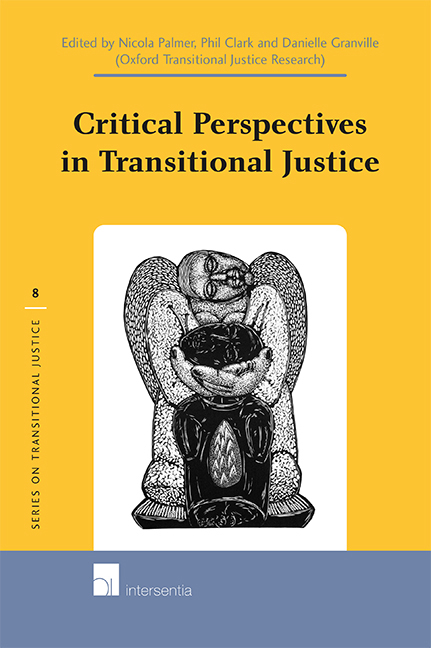Book contents
- Frontmatter
- Note
- Acknowledgements
- Contents
- Abbreviations
- Introduction
- Section 1 Critiquing Core Concepts in Transitional Justice
- Section 2 Accountability, Human Rights and the Rule of Law
- Section 3 Locality and Legitimacy
- Section 4 Memory, Ritual and Apology
- Section 5 Transitional Justice After Transition
- Contributors’ Biographies
- Series on Transitional Justice
25 - Commentary on Transitional Justice After Transition
Published online by Cambridge University Press: 22 December 2020
- Frontmatter
- Note
- Acknowledgements
- Contents
- Abbreviations
- Introduction
- Section 1 Critiquing Core Concepts in Transitional Justice
- Section 2 Accountability, Human Rights and the Rule of Law
- Section 3 Locality and Legitimacy
- Section 4 Memory, Ritual and Apology
- Section 5 Transitional Justice After Transition
- Contributors’ Biographies
- Series on Transitional Justice
Summary
Transitional justice as a discipline has several decades of experience to draw on to inform and shape its practices. This track record underpins the analysis in this section of several post-transition societies, identifying particular factors that may have been key in triggering shifts from transition-era settlements towards fuller post-transitional accountability.
The authors in this section share the premise that the achievement of ‘posttransitional justice’ requires that citizens perceive the justice processes as legitimate. They explain that this legitimacy can be achieved through demanding ‘accountability’ for politically motivated human rights abuses and through pursuing truth recovery processes. The authors review experiences of pursuing accountability for ‘the crimes of the past’ in the post-transitional societies of Latin America, Central-Eastern Europe and South Africa – highlighting the different trajectories that have led them to reconsider transitional justice processes long after the transition has ‘officially’ ended.
This commentary highlights the most compelling and contentious elements of each chapter, then turns to offering a critical perspective on the overarching theme of accountability explored in this section. Against the background of these chapters, this commentary argues that accountability understood as a willingness to accept responsibility for one's actions and to be answerable for them describes a quality of being that holds out hopeful possibilities for the realisation of a society that demonstrates a communal commitment to respect for the law and a sense of confidence in the possibility of justice. It hints at the possibility of people being able to develop ‘a democratic conception of justice which is both compassionate and principled and makes the best sense of both the past and the constitutional vision for the future.’ This vision articulated by Justice Kate O’Regan of the South African Constitutional Court provides a more substantial definition of the content of a fuller, post-transitional accountability – a richer expression of what justice as a societal value might provide.
In the context of Latin America, Cath Collins notes that the justice system initially played a limited role in addressing historical crimes as the region emerged from military dictatorships. This was because debates in the region have historically been framed as choices between democracy and justice. It has consequently taken some forty years to address de facto or de jure impunity of perpetrators of political violence in these countries.
- Type
- Chapter
- Information
- Critical Perspectives in Transitional Justice , pp. 485 - 492Publisher: IntersentiaPrint publication year: 2012



